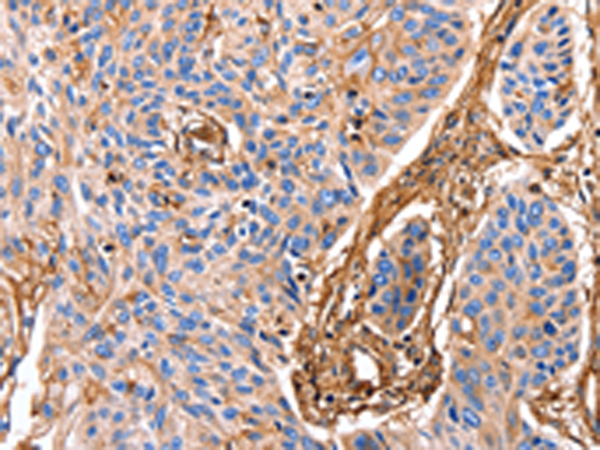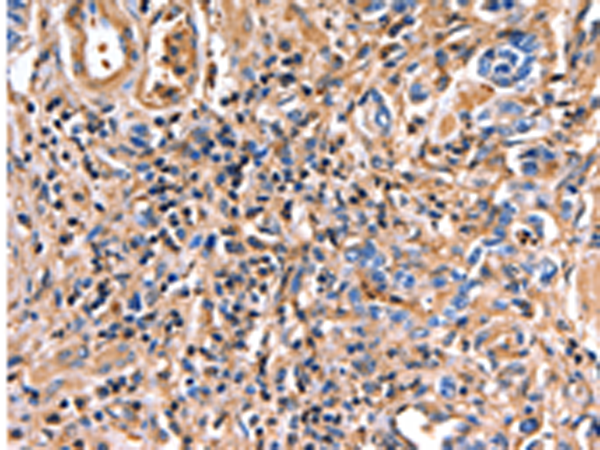


| WB | 咨询技术 | Human,Mouse,Rat |
| IF | 咨询技术 | Human,Mouse,Rat |
| IHC | 1/50-1/200 | Human,Mouse,Rat |
| ICC | 技术咨询 | Human,Mouse,Rat |
| FCM | 咨询技术 | Human,Mouse,Rat |
| Elisa | 1/2000-1/5000 | Human,Mouse,Rat |
| Aliases | ANX6, CBP68 |
| WB Predicted band size | 76 kDa |
| Host/Isotype | Rabbit IgG |
| Antibody Type | Primary antibody |
| Storage | Store at 4°C short term. Aliquot and store at -20°C long term. Avoid freeze/thaw cycles. |
| Species Reactivity | Human, Mouse, Rat |
| Immunogen | Fusion protein of human ANXA6 |
| Formulation | Purified antibody in PBS with 0.05% sodium azide and 50% glycerol. |
+ +
以下是关于NCR3(NKp30)抗体的研究文献示例(内容为示例性概括,建议通过学术数据库核实最新进展):
---
1. **"Targeting NKp30 in cancer immunotherapy: a novel antibody-based approach to enhance NK cell activity"**
*作者:Sivori S. et al.*
摘要:研究探讨了抗NCR3抗体在肿瘤免疫治疗中的应用,通过体外实验和动物模型证明,特定单克隆抗体可激活NK细胞的NKp30受体,增强其对肿瘤细胞的杀伤能力,尤其在血液恶性肿瘤中显示出潜在治疗价值。
2. **"Structural insights into NKp30 receptor-ligand interactions and antibody modulation"**
*作者:Pende D. et al.*
摘要:通过晶体学分析揭示了NKp30与其配体B7-H6的结合机制,并开发了一种阻断性抗体。研究发现该抗体可抑制配体诱导的NK细胞活化,为研究NCR3在免疫调节中的功能提供了分子基础。
3. **"NKp30 antibody-mediated depletion of immunosuppressive cells in chronic viral infections"**
*作者:Münz C. et al.*
摘要:研究利用抗NCR3抗体靶向清除慢性病毒感染中抑制性免疫细胞,实验表明该策略可恢复NK细胞功能,减少病毒载量,提示NCR3抗体在抗病毒治疗中的潜在应用。
4. **"Dysregulated NKp30 in autoimmune disorders: Therapeutic effects of antagonistic antibodies"**
*作者:Vivier E. et al.*
摘要:分析自身免疫疾病中NKp30的异常表达,发现使用特异性抗体阻断NCR3信号可减轻小鼠模型中的炎症反应,为红斑狼疮等疾病的治疗提供新思路。
---
建议通过**PubMed**或**Web of Science**以“NCR3 antibody”“NKp30 therapeutic”等关键词检索最新文献,或关注期刊如*Nature Immunology*、*Blood*的相关研究。
NCR3 (Natural Cytotoxicity Triggering Receptor 3), also known as NKp30. is a key activating receptor expressed on natural killer (NK) cells and a subset of T cells. It belongs to the immunoglobulin superfamily and plays a critical role in innate immune responses by recognizing stress-induced ligands, such as B7-H6. which are often overexpressed on infected or malignant cells. Engagement of NCR3 with its ligands triggers cytotoxic activity and cytokine production, enabling NK cells to eliminate target cells. Dysregulation of NCR3 signaling has been implicated in immune evasion by tumors and certain pathogens, highlighting its therapeutic relevance.
NCR3-specific antibodies are essential tools for studying receptor-ligand interactions, cellular localization, and functional modulation. In research, these antibodies are used in flow cytometry, immunohistochemistry, and functional assays to dissect NCR3's role in immune surveillance. Therapeutically, anti-NCR3 antibodies are being explored to enhance NK cell-mediated cytotoxicity against cancers or to block inhibitory pathways in chronic infections. For example, agonist antibodies may boost antitumor responses, while antagonist antibodies could mitigate immune exhaustion.
Clinical interest in NCR3 has grown due to its dual role in promoting tumor clearance and its potential contribution to immunosuppressive microenvironments. Studies link altered NCR3 expression or polymorphisms to outcomes in melanoma, leukemia, and viral infections. Challenges remain in understanding ligand diversity, receptor trafficking, and context-dependent signaling. Nonetheless, NCR3 antibodies continue to bridge mechanistic insights and translational applications in immunotherapy.
×